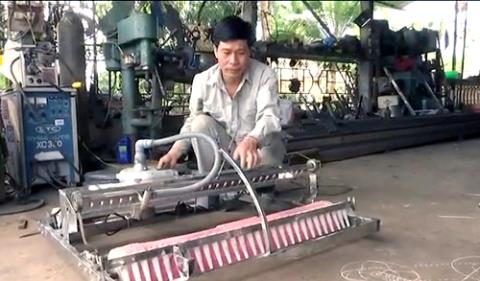
As the inventor of many agricultural machines used widely in Vietnam, Pham Van Hat still cannot obtain patents.
 |
| Pham Van Hat and his machine. |
As the inventor of many agricultural machines used widely in Vietnam, Pham Van Hat still cannot obtain patents.
Hat, 35, a farmer from Tu Ky district in Hai Duong province, is famous nationwide as the inventor of the sowing robot and many other useful machines.
It took Hat two years to create the machine which has 30-40 times higher productivity than manual labor. As the robot can sow exactly in the correct positions, seeds are not wasted. The spacing between seeds can be adjusted according to the types of seedlings, while farmers can save 20-30 percent of seeds.
According to Hat, with the robot, the production cost could decrease by up to VND600,000 per sao (360 square meters). The robot has been sold in 63 cities and provinces nationwide and 14 countries. The machine, surprisingly simple and useful, is priced at VND35-40 million.
A special pesticide spraying machine, also invented by Hat, which can replace tens of workers, sells for VND65 million. A similar foreign made machine is priced at VND400 million.
“At present, I am working on a sweet potato planting machine, which plants seedlings. This machine is still not available in the world,” he said. “I make 3-5 inventions every year.”
Before becoming famous in Vietnam, Hat was well known in Israel where he worked as an export laborer after he took a heavy loss from a failed vegetable crop. As the work was difficult, Hat invented an automatic fertilizer spreading machine attached to the back of a tractor. He got a big award from the owner of the farm and a patent for his machine from an Israeli agency.
Despite the offered high pay from the Israeli boss, Hat decided to return to Vietnam to work on his land. A US agriculture machinery firm also invited Hat to work for it, but Hat turned down the job.
While many foreign companies want to hire Hat, no Vietnamese owned company has offered him a job. And though his machines have been used widely in Vietnam and other countries, Hat still has no patents for the machines.
“It is very difficult to apply for a patent in Vietnam. I have been asked to provide detailed descriptions and models. I am just a ‘barefoot inventor’ and I did not attend any training courses, so I don’t know what to write and draw,” he said.
Meanwhile, in other countries, the procedures are simple. “You just need to prove that your machine is effective and show how many workers the machine can replace to be recognized by appropriate agencies,” he explained.
(Source: VNN)





